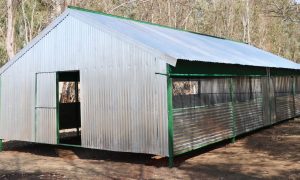The South Africa’s agricultural sector enjoyed a relative high government protection and support before 1993. Protection came in the form of quantitative import restrictions, single marketing channel through control boards and a multitude of tariffs on products. The first wind of change came in 1994 when the country signed the Marrakech Agreement and agreed to remove quantitative controls over imports and also lowered tariffs. South Africa’s general tariff reduced from 23% in 1990 to 6.97% in 1997 and tariffs on agricultural products fell to 5.31% in 1997. The country also simplified its tariff book with the number of tariff lines decreasing from 13 609 pre-1993 to 6 420 in 2000. The second phase of reforms took place after the promulgation of the Marketing of Agricultural Products Act of 1996, which abolished control boards thus leading to a weakened public service’s ability to develop markets, collect information and conduct generic promotions on agricultural products.
Support to agriculture very low and continues to decline
The market and trade reforms led to the South African agriculture becoming the least supported sector as compared to its competitors in the world. The Producer Support Estimate (PSE) which measures farmer support from consumers (e.g. in the form of price support policies) and government (e.g. in the form of budgetary and tax conciliations), confirms that support to South Africa’s agricultural industries is low and been declining over the past two decades. The PSE as share of gross farm receipts (GFR) declined from 5% in 2005 to less than 2% in 2017. However, in the European Union, the PSE as share of GFR is closed to 20%, USA is above 10% and similar level of support is witnessed in China and Brazil. While the overall support to South African agriculture is significantly low, products like sugar, milk, and wheat do received a relatively large support. Farmers producing sugar and milk received at least 26% and 6% of support as a share of GFR respectively. The rest of farmers have almost zero support and are subjected to constantly rising production costs and sometimes unfair competition from better supported international farmers.
Tariffs protection increasingly becoming a hope for farmers
As part of the survival strategy in the past two decades, South African farmers have focused on improving efficiency and gaining economies of scale. This technique seems to have reached a plateau as farmers continue to feel the pressure of increasing imports and rising production costs. Farmers are now relying on tariff policy as a mean of protection from forever growing imports. In recent months, sugar farmers approached the International Tariff Administration Commission (ITAC) for more protection, requesting tariff increase in the Dollar Based Referenced Price (DBRP) from US$ 566/ton to US$856/ton. However, ITAC only granted them an increase to US$680/ton. The poultry farmers have also approached the ITAC requesting an increase in tariff on certain poultry cuts such as bone-in and boneless to a bound level of 82% ad valorem rate. Other farmers in wheat and maize industries have also approached the ITAC for tariff escalation. The growing tariff applications have pushed up the average applied tariffs in agriculture from 5.31% ad valorem in 1997 to 10.97% ad valorem in 2010 and to 19% ad valorem in 2019. This implies that applied agricultural tariffs have increased by 74.3% in the past eight years. The fast-growing tariffs in South African agriculture indicates that farmers have contaminated the mercantilist fever. Mercantilism is a trade policy that was very popular in the 16th century- where farmers restricted imports.
Mercantilism approach not good for consumers and the economy
Does increasing tariffs help farmers, consumers and the country’s welfare? Trade theory and in country studies by both academia and public institutions are in agreement that tariff escalations are not good for the economic growth and could lead to job losses in the medium to long term. Yes, in the short term, tariffs escalations do provide partial relief to farmers that are challenged with increasing imports. While this is known, farmers are left with little options but to resort on tariffs for protection due to poor farmer support in the country. The sector is in an urgent need for broader reform of markets, farmer support and trade policies to unlock new growth and development. The need to review marketing and trade policy decisions taken in the mid-1990s were also highlighted by the committee on agricultural marketing environment chaired by Prof Mohammed Karaan in 2006, which was appointed by then Minister Thoko Didiza in her first stint as the leader in agricultural sector. Unfortunately, the recommendations of Prof Karaan’s committee were never implemented but they remain relevant even today. The agricultural community need to enhance awareness of this report, so the minister can have another opportunity to spearhead the necessary policy and institution reforms required to revitalize the agricultural sector for better and inclusive growth and development. Fortunately, the very same Minister who appointed the Karaan’s committee is back at the helm of the sector. The aforementioned reforms are also in line with some policy suggestions raised by the National Treasury on 27 August 2019 in their policy strategy paper titled “Economic transformation, inclusive growth, and competitiveness: towards an economic strategy for South Africa”. In closure for the agricultural sector to attain a new growth path, there must be decisive policy and institutional reforms to unlock such growth.
By Dr Sifiso Ntombela, sifiso@namc.co.za




















